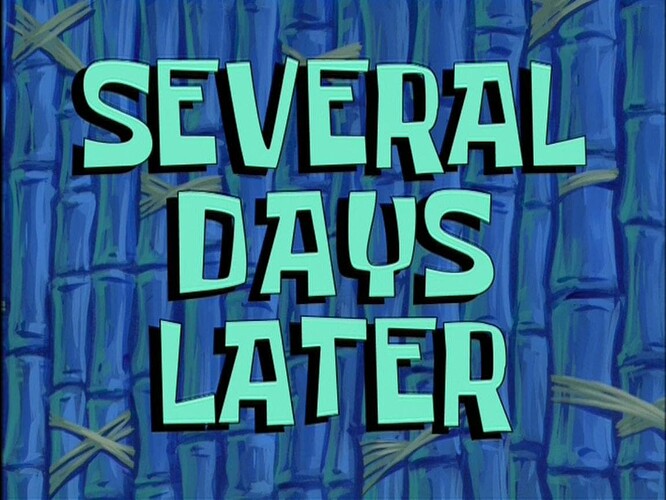
They’re not the only ones. Guardian ran with it too. I thought that story looked suspicious. The absolute numbers of people making themselves ill with ivermectin are very small.
Edit: Also this is what I meant when I said the media take on ivermectin sucks now. Of course I don’t care that people are laughing at conservatives for eating horse medicine. I do care that the media these days just craft every story to be maximally appealing and digestible to their readership and don’t really give a shit whether what they’re writing is accurate.
https://twitter.com/DrewHolden360/status/1434591443855753220
A thread in which half the liberal media fall all over themselves to repeat an obviously dubious story which could have been debunked if they’d bothered to make a single phone call. Instead of outright retracting an entirely fraudulent story, Rolling Stone have just posted an “update” at the top.
Speaking of retractions, there’s also this beauty from the AP:
JACKSON, Miss. (AP) — In an article published Aug. 23, 2021, about people taking livestock medicine to try to treat coronavirus, The Associated Press erroneously reported based on information provided by the Mississippi Department of Health that 70% of recent calls to the Mississippi Poison Control Center were from people who had ingested ivermectin to try to treat COVID-19. State Epidemiologist Dr. Paul Byers said Wednesday the number of calls to poison control about ivermectin was about 2%. He said of the calls that were about ivermectin, 70% were by people who had ingested the veterinary version of the medicine.
Whoops! It’s almost like the media are willing to just repeat stories without even thinking critically about them, let alone fact-checking them, as long as they reify some narrative in which liberals are emotionally invested. I mean this entire story about how lots of people are poisoning themselves with ivermectin is totally made up, this shit is literal fake news and people would be totally justified to draw the conclusion that the media aren’t interested in trying to figure out the truth.
This is going to be 10 times worse if it turns out that ivermectin is actually helpful for COVID, something which is still entirely in the realms of possibility.
It’s fun to be on the side that has to be right 100% of the time or face serious consequences, while the other side can effortlessly move on from “Covid is just the flu” and “HCQ is a miracle cure” to “Ivermectin!” without even the tiniest hint of accountability.
Two things:
- Being right or not fucking matters at all for the ivermectin believers.
- Realm of possibility standard is also utter garbage. If there’s suddenly evidence that ivermectin works later, that doesn’t mean the people who correctly interpret the available evidence today are wrong. This is a really bad take tbh.
Obviously conservative media are worse, but the issue here is not that the media printed things that weren’t true. It’s that - in the case of the Oklahoma story in particular - they were very obviously content to rely on their worldview to tell them whether something sounded true or not, rather than make even the most basic efforts to figure out the facts.
I didn’t say it would mean that, but the correct interpretation of the evidence right now is “ivermectin probably doesn’t work for COVID, but it’s possible and there are some reasons to think it might”. The correct interpretation is not “it definitely doesn’t work because the FDA said so even though nobody actually knows, and also it’s very dangerous and people are poisoning themselves by the thousands”.
This is a simple misinterpretation of how evidence based medicine works. Ivermectin believers have to show evidence that it works. There’s zero high quality evidence that it does. It’s not up to the EBM based community to disprove every single ivermectin hypothesis. Your framing of the issue is simply wrong.
Your posts are really familiar. I swear I’ve seen tweets with things almost word for word what you’ve said. They’re wrong.
I have no idea how you interpret what I’ve written as suggesting that ivermectin believers aren’t required to show evidence that it works. What I’m saying is that you shouldn’t write categorical headlines “X does not work for COVID” when the evidence is equivocal. It would be incorrect for me to write “Novavax doesn’t work for COVID” claiming that this is OK because “as yet unproven” and “doesn’t work” are the same thing. It’s OK for me to write “HCQ doesn’t work for COVID” because that has now actually been shown. If you think it has been demonstrated that ivermectin doesn’t work - as opposed to the evidence for it not being compelling - then fine, but I disagree.
It’s because you say stuff like this:
Which is patently untrue and only makes any sort of sense is if you think you have to disprove ivermectin working in every possible way.

I mean, if you can’t agree that it would be wrong to write “Novavax doesn’t work for COVID”, then we have reached an impasse on theories of how the English language works.
I think to write “ivermectin doesn’t work for COVID” you should have to demonstrate that ivermectin doesn’t work for COVID, yes.
Edit: Or at the very least, it should be true that there’s no reason at all to think that it works for COVID, which is also not the case with ivermectin.
So basically my interpretation of your position is entirely correct? Great. Glad we got through that. Your position is wrong. The default is that it doesn’t work. Furthermore, it’s failed initial clinical studies. At least one of the positive studies was falsified. It doesn’t work. If there was any good evidence that it did work, it’d be used by the medical community in a heartbeat. We’d all love for it to work.
They weren’t relying on their worldview to tell them anything. They knew the story would generate lots of clicks and thus revenue. It’s why almost all media is terrible, when its about profit and not truth you’re incentivized to report the most controversial story and not the truth.
Here’s something that may help the two of you overcome this impasse. Or it may not.
Imagine that there is a very well-designed (by whatever criteria you choose) RCT comparing ivermectin with placebo in COVID patients. The trial shows no significant difference in outcomes between the ivermectin group and the placebo group.
I assume both of you would agree that “Based on this trial, there is no evidence that ivermectin works for COVID”
But what would you say about this: “This trial proves that ivermectin does not work for COVID”. Would you agree with that statement? If so, why? If not, why not?
I realize that this thought experiment does not reflect the current state of ivermectin research. It is hypothetical.
It wouldn’t truly prove it, because there’s always a subpopulation you could try to identify were it might have some benefit. Shit, run enough trials and you could ‘prove’ that it works in a certain subpopulation. It’s a common ploy used by drug companies*. That’s essentially what happened in thrombolytics and stroke.
You saw this with HCQ. First it was pushed as a therapeutic for acutely ill patients, then it was for early on to prevent more serious disease and even prevention from contracting covid. Ivermectin is going through the same process.
*This is the second most common ploy from a completely non-scientific recollection. The most common thing is making the control group sicker than the experimental group somehow.
Epistemological uncertainty springs eternal, but that is why we make people prove the positive and make the negative the default. If you think some substance helps, you have to prove it rather than relying on eternal optimism that it may someday be proven to work. That it is really hard to prove something doesn’t work is not evidence in favor of throwing random substances at the ill.
Saying that things “do” or “don’t” work here is necessarily probabilistic, one can only ever become ever-increasingly certain, and therefore the threshold at which we use that definitive language is necessarily arbitrary. In your hypothetical, of course it’s incorrect to say that the trial proves that ivermectin doesn’t work (like they could hardly write that in the conclusion to their study), but if there were no other reason to think it worked and someone said “it doesn’t work” on the basis of one trial, it wouldn’t bother me, as “it’s now very low-probability that this is a thing”, which is what is really being said, is correct.
Of course I understand the toddler-level idea that our default attitude towards entities (the entity in this case being “a relationship between ivermectin and improved COVID outcomes”) should be that they don’t exist until demonstrated to exist. But saying something “doesn’t work” is a positive claim. If you ask what I think about a murder case, I say “he didn’t do it” and you ask why I think that, “oh I don’t actually know anything about the case, I’m merely expressing the idea that people are innocent until proven guilty” isn’t a reasonable reply. This attempt to be Captain Pedantic is just wrong, that just isn’t what “he didn’t do it” conveys as a basic matter of language.
You could argue that “ivermectin doesn’t work” is the right way to do messaging on this, but I honestly don’t think it’s any more convincing to anyone than saying “unlikely to work” and I think it’s dangerous to be prematurely definitive on controversial subjects.
You really don’t. And it’s extremely frustrating. The fact that you think is a toddler level idea just further illustrates you don’t understand it at all.
Are you OK with saying “Novavax doesn’t work for COVID”? Yes or no.
If no, why not?
Taking a strong initial stance might not convince more people, but it will make the people you do convince more resolute in the face of contrary opinions. It’s a problem that Democrats do not tend to provide a strong, early anchor for people to attach themselves to on controversial issues, yielding that advantage to conservatives who have a weapon like Fox News.
